新概念第二册Lesson 3 Please send me a card课件(共35张PPT)
文档属性
| 名称 | 新概念第二册Lesson 3 Please send me a card课件(共35张PPT) | 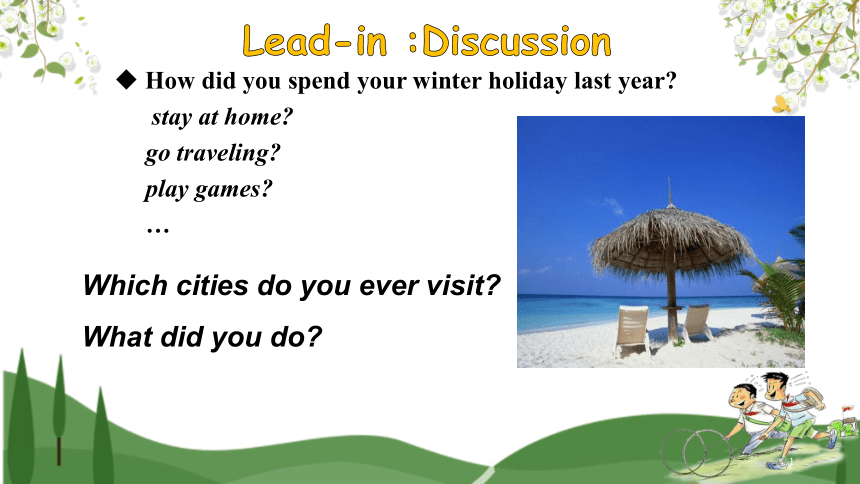 | |
| 格式 | pptx | ||
| 文件大小 | 2.0MB | ||
| 资源类型 | 教案 | ||
| 版本资源 | 新概念英语 | ||
| 科目 | 英语 | ||
| 更新时间 | 2025-01-02 17:07:23 | ||
图片预览





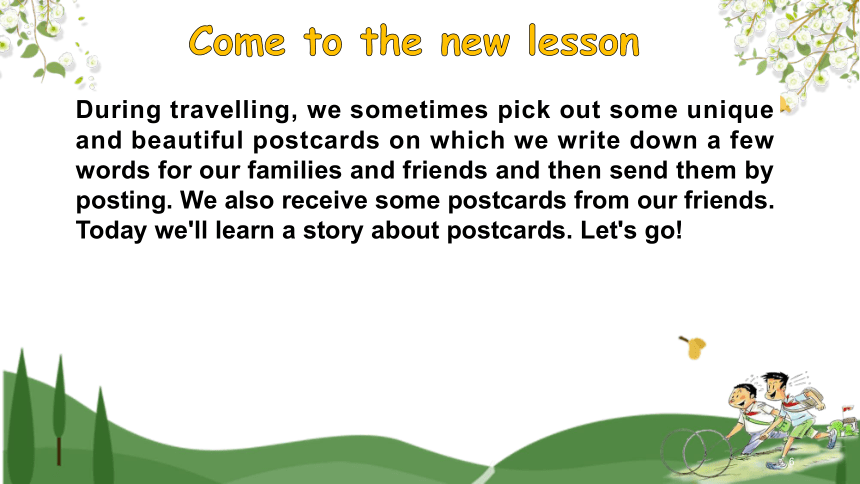
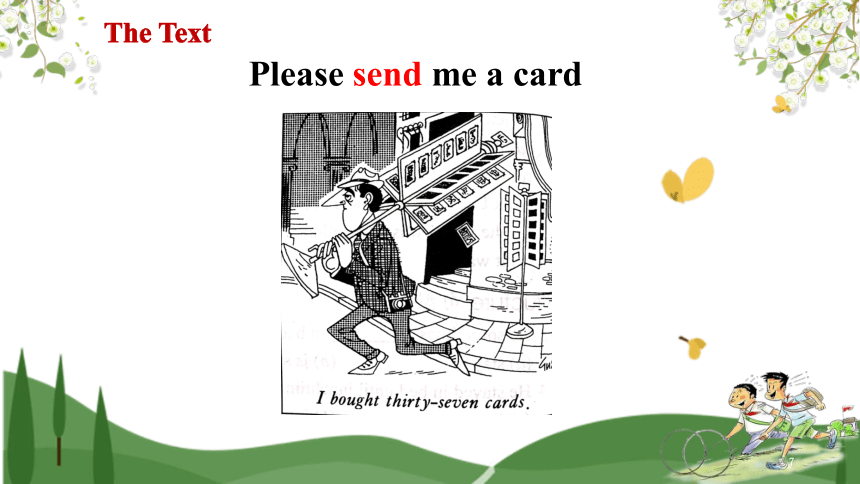


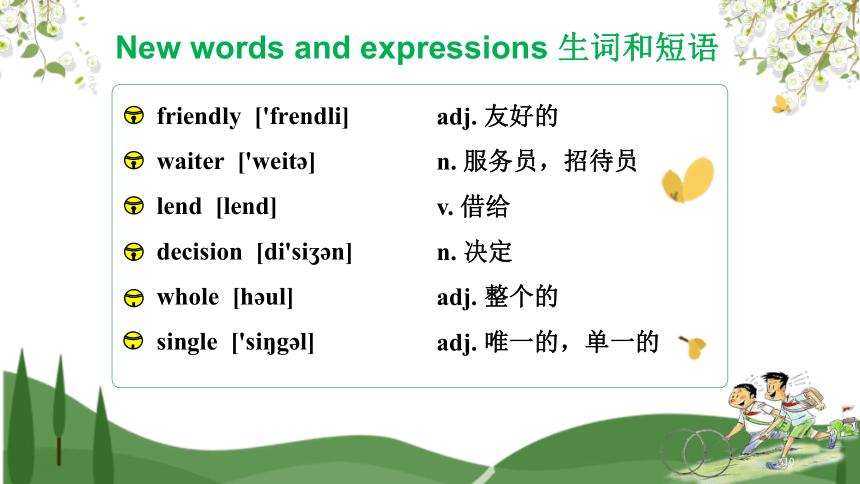
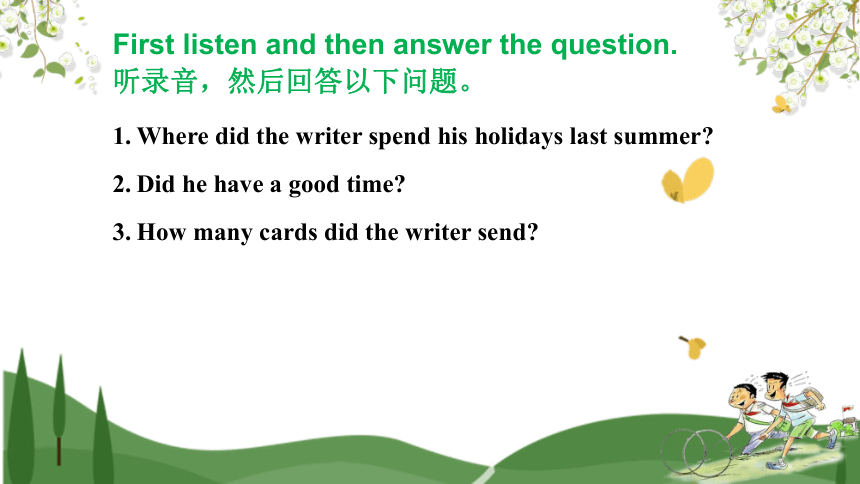
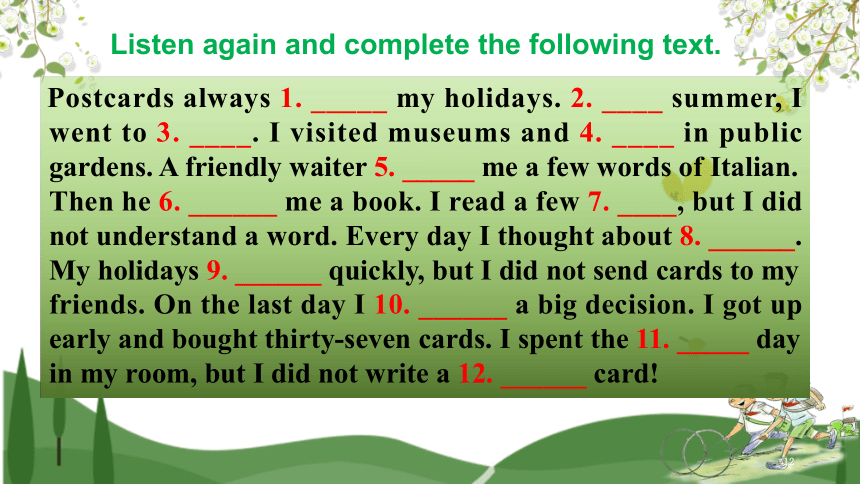
文档简介
(共35张PPT)
Lead-in :DiscussionHowdid you spend your winter holiday last year stay at home go traveling play games …Which cities do you ever visit What did you do National flagLocationItalyItalianDo you know Italy Advice for Traveling to ItalyCrazy forancient culture Rome (Capital) is your best choice!All roads to Rome.Crazy for water and carnival Go to VeniceCrazy for sunshine and beaches Go to Sicilia!西西里岛Come to the new lessonDuring travelling, we sometimes pick out some unique and beautiful postcards on which we write down a few words for our families and friends and then send them by posting. We also receive some postcards from our friends. Today we'll learn a story about postcards. Let's go!Pleasesendme a cardThe TextPleasesendme a card.take和send的区别:take强调某人亲自送。send则是通过第三人去送,如校车。e.g.送花给他的母亲/女孩:take flowers to hismother(自己送)send flowers to hisgirl(叫别的的人送)New words and expressions生词和短语send[send]postcard['p ustkɑ:d]spoil[sp il]museum[mju:'zi m]public['p blik]v.寄,送n.明信片v.使索然无味,损坏n.博物馆adj.公共的New words and expressions生词和短语friendly ['frendli]waiter['weit ]lend[lend]decision[di'si n]whole[h ul]single['si g l]adj. 友好的n.服务员,招待员v.借给n.决定adj.整个的adj.唯一的,单一的First listen and then answer the question.
听录音,然后回答以下问题。
Where did the writer spend his holidays last summer
Did he have a good time
How many cards did the writer send
Postcards always1. _____my holidays.2. ____summer, I went to3. ____. I visited museums and4. ____in public gardens. A friendly waiter5. _____me a few words of Italian. Then he6. ______me a book. I read a few7. ____, but I did not understand a word. Every day I thought about8. ______. My holidays9. ______quickly, but I did not send cards to my friends. On the last day I10. ______a big decision. I got up early and bought thirty-seven cards. I spent the11. _____day in my room, but I did not write a12. ______card!Listen again and complete the following text.Postcards always1. spoilmy holidays.2. Lastsummer, I went to3. Italy. I visited museums and4. satin public gardens. A friendly waiter5. taughtme a few words of Italian. Then he6. lentme a book. I read a few7. lines, but I did not understand a word. Every day I thought about8. postcards. My holidays9. passedquickly, but I did not send cards to my friends. On the last day I10. madea big decision. I got up early and bought thirty-seven cards. I spent the11. wholeday in my room, but I did not write a12. singlecard!Listen again and complete the following text.Phrases(短语)搅乱我的假期公园几个词几行字借给我一本书考虑寄卡片给我朋友做出重大决定度过一整天写任一张卡片spoil my holidayspublic gardensa few wordsa few lineslend me a bookthink aboutsend cards to my friendsmade a big decisionspent the whole daywrite a single cardkey words and expressions单词拓展与巩固练习Ithought aboutpostcards.think about = consider想;考虑;思考think of想起;记得。e.g. 1.我一直在想我的周日计划。I am thinking about my Sunday's plan.2.我想不起她的名字。I can't think of her name.Postcards alwaysspoilmy holidays.★ spoil (spoiled/spoilt)① vt.弄坏,损坏,糟蹋1.这不幸的消息使我们没能过好周末。The sad news spoiled our weekend.2.这场雨把学校运动会弄得一团糟。The rain spoiled the school sports meeting.② vt.宠坏,惯坏,溺爱3.不能太惯孩子。Don’t spoil your children.4.这个小男孩的父母很宠爱他。His parents spoiled the boy.破坏:breakbreak the windows打破玻璃damage:程度不一定很重;被破坏的对象受损程度较小,可以修复destroy:彻底摧毁,不能修复以上三个是指物理上的破坏,而spoil主要指精神上的。Postcards alwaysspoilmy holidays.I visited museums and sat inpublicgardens.★public① adj.公共的,公众的,社会的e.g. 1.在我们镇上,有个公共图书馆 There is a public library in our town.② adj.公开的,众人皆知的e.g. 2.他们的秘密会晤20年以后才被公开。 Their secret meeting was made public 20 years later.in public公开的;in private私下里的e.g. 3.让我们私下谈谈 Let’s have a conversation in private.③ n.公众,群众,大众e.g. 4.博物馆在周日对公众开放。 The museum is open to the public on Sundays.Afriendlywaiter taught mea fewwords of Italian.★friendly adj.friendly单独使用时一般做定语。a friendly face/smileShe gave me a friendly greeting. be friendly to/towards sb.他对约翰不友好。 He is not very friendly to John.in a friendly way作为状语她友好的向我问好。 She greeted me in a friendly way.以-ly结尾的adj.★ decision n.决定make /take a (+ ) decision作出(+ )决定e.g.1.对我来说作出这个决定是很困难的。 It was not easy for me to make/take this decision.e.g.2.你作出决定了吗? Have you made/taken a decision decide v.决定decide to do sth决定做某事e.g.1.你为什么决定要找一份新工作?Why did you decide to look for a new job On the last day I made a bigdecision.I spent awholeday in my room,but I did not write asinglecard!★whole adj.整个的e.g.一整瓶牛奶a whole bottle of milke.g.整天the whole daye.g.整整两星期two whole weeksall adj.all (the) day整天all of usall of the students★singleadj. 单身的, 单程的, 单一的a single bed单人床a single ticket单程票single单一的←→double 双倍的single 单身的←→married已婚的I spent awholeday in my room,but I did not write asinglecard!The simple past tense一般过去时肯定式否定式疑问式简答I/He/She _______ a teacher.I/He/She _______/________ a teacher.______ I/He/She a teacher.Yes, I/He/She ______.或No, I/he/she ________.It _______Mary.It _______Mary._______ itMary Yes, it ______.或No, it ________.We/You/They ________ students.We/You/They ________/ ________students.________ we/you/they students Yes, we/you/they ______.或No,we/you/they________.be动词的一般过去时的构成肯定式否定式疑问式简答I/He/She/It _______.I/He/She/It _______/________ play.______ I/he/she/it play.Yes, I/He/She/It______.或No, I/he/she/It________.We/You/They ________ .We/You/They ________/ ________ play.________ we/you/they play Yes, we/you/they ______.或No,we/you/they________.实义动词的一般过去时的构成(play)b. 用法1.表示________________动作或存在的状态;2.表示过去____________________动作;3.表示过去特定时间一次完成的具有_______顺序的几个动作;4.追述____________人或事;e.g.I receied a strange phone call yeserday.I always got up too late, and never had enough time for breakfast.I got up early, washed my face, had a quick breakfast and hurried to school.The book was written by Liang Shiqiu.表示过去的时间状语____________ 刚才____________ 昨晚the other day _______________at that moment _____________a few days ago _________________________ 昨天___________ 去年at that time ____________________________ 在2005年in the old days ___________________表示经常或反复发生的时间标志:______________________________________规则动词过去式、过去分词的构成规则动词原形过去式过去分词一般动词加-edhelp, look, work词尾为不发音的e,加-dlike, live, love词尾为“辅音字母+-y”,去掉y加-iedtry, study, cry重读闭音节结尾,且词尾只有一个辅音字母,双写这个字母后加-edplan, stop, nod动词过去式、过去分词发音规律为:① 在清辅音后发[___],e.g. helped、finished、stopped② 在元音或浊辅音后读[___],e.g. stayed、agreed、planned③ 辅音[t][d]后读[____],e.g. wanted、neededDirect object & Indirect object直接宾语&间接宾语Direct object & Indirect object1. What's the object 宾语表示动作的__________或动作的__________________;2.双宾及物动词直接宾语:指_____;动作的_______承受者;间接宾语:指_____;动作的_______承受者;3.结构形式:vt.+sb.+sth.vt.+sth.+_______sb. :① to侧重指动作的方向,表示“朝/向/对着”② for侧重指动作的受益者,表示“为了.../替...”③ to/for均可④ 只能v.+sb.+sth.e.g.a. I returned him the storybook.= I returned the storybook ____ him.b. I'll find you another chance.= I'll find anther chance ____ you.c. I'll get you some tea.= I'll get some tea ________ you.d.祝你路途愉快。toforto/for×双宾动词
Lead-in :DiscussionHowdid you spend your winter holiday last year stay at home go traveling play games …Which cities do you ever visit What did you do National flagLocationItalyItalianDo you know Italy Advice for Traveling to ItalyCrazy forancient culture Rome (Capital) is your best choice!All roads to Rome.Crazy for water and carnival Go to VeniceCrazy for sunshine and beaches Go to Sicilia!西西里岛Come to the new lessonDuring travelling, we sometimes pick out some unique and beautiful postcards on which we write down a few words for our families and friends and then send them by posting. We also receive some postcards from our friends. Today we'll learn a story about postcards. Let's go!Pleasesendme a cardThe TextPleasesendme a card.take和send的区别:take强调某人亲自送。send则是通过第三人去送,如校车。e.g.送花给他的母亲/女孩:take flowers to hismother(自己送)send flowers to hisgirl(叫别的的人送)New words and expressions生词和短语send[send]postcard['p ustkɑ:d]spoil[sp il]museum[mju:'zi m]public['p blik]v.寄,送n.明信片v.使索然无味,损坏n.博物馆adj.公共的New words and expressions生词和短语friendly ['frendli]waiter['weit ]lend[lend]decision[di'si n]whole[h ul]single['si g l]adj. 友好的n.服务员,招待员v.借给n.决定adj.整个的adj.唯一的,单一的First listen and then answer the question.
听录音,然后回答以下问题。
Where did the writer spend his holidays last summer
Did he have a good time
How many cards did the writer send
Postcards always1. _____my holidays.2. ____summer, I went to3. ____. I visited museums and4. ____in public gardens. A friendly waiter5. _____me a few words of Italian. Then he6. ______me a book. I read a few7. ____, but I did not understand a word. Every day I thought about8. ______. My holidays9. ______quickly, but I did not send cards to my friends. On the last day I10. ______a big decision. I got up early and bought thirty-seven cards. I spent the11. _____day in my room, but I did not write a12. ______card!Listen again and complete the following text.Postcards always1. spoilmy holidays.2. Lastsummer, I went to3. Italy. I visited museums and4. satin public gardens. A friendly waiter5. taughtme a few words of Italian. Then he6. lentme a book. I read a few7. lines, but I did not understand a word. Every day I thought about8. postcards. My holidays9. passedquickly, but I did not send cards to my friends. On the last day I10. madea big decision. I got up early and bought thirty-seven cards. I spent the11. wholeday in my room, but I did not write a12. singlecard!Listen again and complete the following text.Phrases(短语)搅乱我的假期公园几个词几行字借给我一本书考虑寄卡片给我朋友做出重大决定度过一整天写任一张卡片spoil my holidayspublic gardensa few wordsa few lineslend me a bookthink aboutsend cards to my friendsmade a big decisionspent the whole daywrite a single cardkey words and expressions单词拓展与巩固练习Ithought aboutpostcards.think about = consider想;考虑;思考think of想起;记得。e.g. 1.我一直在想我的周日计划。I am thinking about my Sunday's plan.2.我想不起她的名字。I can't think of her name.Postcards alwaysspoilmy holidays.★ spoil (spoiled/spoilt)① vt.弄坏,损坏,糟蹋1.这不幸的消息使我们没能过好周末。The sad news spoiled our weekend.2.这场雨把学校运动会弄得一团糟。The rain spoiled the school sports meeting.② vt.宠坏,惯坏,溺爱3.不能太惯孩子。Don’t spoil your children.4.这个小男孩的父母很宠爱他。His parents spoiled the boy.破坏:breakbreak the windows打破玻璃damage:程度不一定很重;被破坏的对象受损程度较小,可以修复destroy:彻底摧毁,不能修复以上三个是指物理上的破坏,而spoil主要指精神上的。Postcards alwaysspoilmy holidays.I visited museums and sat inpublicgardens.★public① adj.公共的,公众的,社会的e.g. 1.在我们镇上,有个公共图书馆 There is a public library in our town.② adj.公开的,众人皆知的e.g. 2.他们的秘密会晤20年以后才被公开。 Their secret meeting was made public 20 years later.in public公开的;in private私下里的e.g. 3.让我们私下谈谈 Let’s have a conversation in private.③ n.公众,群众,大众e.g. 4.博物馆在周日对公众开放。 The museum is open to the public on Sundays.Afriendlywaiter taught mea fewwords of Italian.★friendly adj.friendly单独使用时一般做定语。a friendly face/smileShe gave me a friendly greeting. be friendly to/towards sb.他对约翰不友好。 He is not very friendly to John.in a friendly way作为状语她友好的向我问好。 She greeted me in a friendly way.以-ly结尾的adj.★ decision n.决定make /take a (+ ) decision作出(+ )决定e.g.1.对我来说作出这个决定是很困难的。 It was not easy for me to make/take this decision.e.g.2.你作出决定了吗? Have you made/taken a decision decide v.决定decide to do sth决定做某事e.g.1.你为什么决定要找一份新工作?Why did you decide to look for a new job On the last day I made a bigdecision.I spent awholeday in my room,but I did not write asinglecard!★whole adj.整个的e.g.一整瓶牛奶a whole bottle of milke.g.整天the whole daye.g.整整两星期two whole weeksall adj.all (the) day整天all of usall of the students★singleadj. 单身的, 单程的, 单一的a single bed单人床a single ticket单程票single单一的←→double 双倍的single 单身的←→married已婚的I spent awholeday in my room,but I did not write asinglecard!The simple past tense一般过去时肯定式否定式疑问式简答I/He/She _______ a teacher.I/He/She _______/________ a teacher.______ I/He/She a teacher.Yes, I/He/She ______.或No, I/he/she ________.It _______Mary.It _______Mary._______ itMary Yes, it ______.或No, it ________.We/You/They ________ students.We/You/They ________/ ________students.________ we/you/they students Yes, we/you/they ______.或No,we/you/they________.be动词的一般过去时的构成肯定式否定式疑问式简答I/He/She/It _______.I/He/She/It _______/________ play.______ I/he/she/it play.Yes, I/He/She/It______.或No, I/he/she/It________.We/You/They ________ .We/You/They ________/ ________ play.________ we/you/they play Yes, we/you/they ______.或No,we/you/they________.实义动词的一般过去时的构成(play)b. 用法1.表示________________动作或存在的状态;2.表示过去____________________动作;3.表示过去特定时间一次完成的具有_______顺序的几个动作;4.追述____________人或事;e.g.I receied a strange phone call yeserday.I always got up too late, and never had enough time for breakfast.I got up early, washed my face, had a quick breakfast and hurried to school.The book was written by Liang Shiqiu.表示过去的时间状语____________ 刚才____________ 昨晚the other day _______________at that moment _____________a few days ago _________________________ 昨天___________ 去年at that time ____________________________ 在2005年in the old days ___________________表示经常或反复发生的时间标志:______________________________________规则动词过去式、过去分词的构成规则动词原形过去式过去分词一般动词加-edhelp, look, work词尾为不发音的e,加-dlike, live, love词尾为“辅音字母+-y”,去掉y加-iedtry, study, cry重读闭音节结尾,且词尾只有一个辅音字母,双写这个字母后加-edplan, stop, nod动词过去式、过去分词发音规律为:① 在清辅音后发[___],e.g. helped、finished、stopped② 在元音或浊辅音后读[___],e.g. stayed、agreed、planned③ 辅音[t][d]后读[____],e.g. wanted、neededDirect object & Indirect object直接宾语&间接宾语Direct object & Indirect object1. What's the object 宾语表示动作的__________或动作的__________________;2.双宾及物动词直接宾语:指_____;动作的_______承受者;间接宾语:指_____;动作的_______承受者;3.结构形式:vt.+sb.+sth.vt.+sth.+_______sb. :① to侧重指动作的方向,表示“朝/向/对着”② for侧重指动作的受益者,表示“为了.../替...”③ to/for均可④ 只能v.+sb.+sth.e.g.a. I returned him the storybook.= I returned the storybook ____ him.b. I'll find you another chance.= I'll find anther chance ____ you.c. I'll get you some tea.= I'll get some tea ________ you.d.祝你路途愉快。toforto/for×双宾动词
同课章节目录
